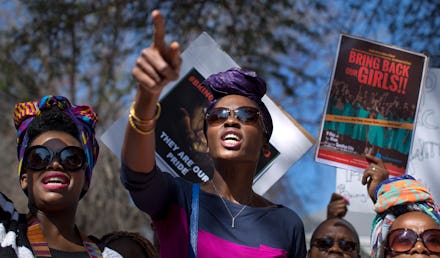Al-Qaida's Thoughts on Boko Haram Will Make You Even More Terrified For the Missing Girls

The news: You know that you're getting too extreme if even al-Qaida is giving you major side-eye.
That's precisely what's happening with Boko Haram, the Islamist group behind the April kidnapping of over 270 schoolgirls in Nigeria. Though it's known to be loosely affiliated with al-Qaida, it is now catching flak from Islamist militants who believe that the group went too far and is even being counterproductive to al-Qaida's goals.
The New York Times contends that Muslim scholars and Islamist parties around the world rejected Boko Haram many years ago for its "senseless cruelty and capricious violence against civilians." But despite their self-distancing, this week's actions have been too much even for "fellow militants normally eager to condone terrorist acts against the West and its allies." Notes the Times:
"'Such news is spread to taint the image of the Mujahedeen,' wrote one dubious poster on a web forum used by Islamic militants whose administrator uses a picture of Osama bin Laden."
"The violence most of the African rebel groups practice makes al-Qaida look like a bunch of schoolgirls," Bronwyn Bruton, an Africa scholar at the Atlantic Council in Washington, told the Times. "And al-Qaida at this point is a brand — and pretty much only a brand — so you have to ask yourself how they are going to deal with the people who are doing things so hideous even the leaders of al-Qaida are unwilling to condone them."
The background: It's important to keep in mind that Boko Haram did not start off as an al-Qaida offshoot. The group was founded a decade ago by the radical Kanuri cleric Mohammed Yusuf, who gained popularity in the troubled Nigerian region of Borno. After his death, he was succeeded by current leader Abubakar Shekau, and over time, the group evolved into a national insurgency fighting to institute Sharia law.
Unlike al-Qaida, Boko Haram's goals are highly localized and based on a cult of personality. Shekau claims to communicate directly with God and demands complete obedience from his followers, which doesn't sit well with many in the al-Qaida network.
Why this is important: Though it's easy to loop all radical Islamist groups together, the fragile relationship between Boko Haram and al-Qaida captures this network's true fragmentation.
Since Osama bin Laden's death, al-Qaida has become much more conscious about its image. Afraid of alienating potential supporters, it has called upon its allies to reduce attacks on civilians and noncombatants. Dispute over indiscriminate violence is precisely why al-Qaida has cut ties with Iraq's Abu Musab al-Zarqawi and the Syrian jihadist group Islamic State in Iraq and the Levant (ISIS) — earlier this year, the Arabian Peninsula branch punished one of its fighters for throwing a grenade at unarmed medics at a hospital.
Given how strict al-Qaida has become in determining whether certain affiliates or activities are "on brand," Boko Haram is treading on thin ice right now. Al-Qaida's core leadership hasn't publicly commented on the kidnapping, but the high-profile incident — coupled with Boko Haram's increasing streak of murders and bombings — is generating a lot of bad publicity for everyone. Who knows how much longer they'll put up with it?
Editor's Note 5/10/14: The gif that appeared in an earlier version of this article has been removed.